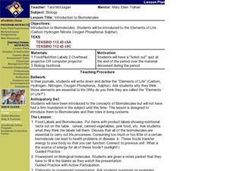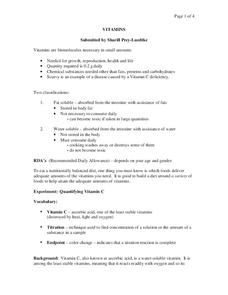Curated OER
Biological Molecules
Ninth graders examine the structure and function of biomolecules. In this food molecule instructional activity, 9th graders will examine various types of biomolecules such as carbohydrates, lipids, proteins, and nucleic acids. They...
Curated OER
Biomolecules
Students perform an experiment in which they test foods for the presence of proteins, carbohydrates, and lipids. They identify the molecular structure of each type of biomolecule and then discuss how biomolecules relate to nutrition and...
Teach Engineering
DNA Forensics and Color Pigments
Use food coloring in electrophoresis. The last segment in a four-part series mimics DNA fingerprinting by using chromatography. Teams conduct chromatography on food coloring to find colors that use similar pigmentation in their makeup.
Curated OER
Introduction to Biomolecules
Young scholars are introduced to biomolecules and their roles in livin systems. They are introduced to the "Elements of Life." Students write down and define the "Elements of Life." They are asked why they think those elements are...
Curated OER
Biochemical Placemats
Students group various foods according to whether they are proteins, carbohydrates, or lipids. This activity is a multisensory way of introducing students to biochemistry. Students also learn how icons represent the molecular composition...
Curated OER
What Should I Know about Biosphere?
If your class is learning about the biosphere, you may find a study guide or reading guide helpful. Focusing on vocabulary, processes, and interactions, the Word document is easy to edit as needed to fit your needs. Another great option...
Curated OER
Vitamins
Students determine the amount of vitamin C present in 3 samples of juice stored in various light conditions. In this vitamin lesson plan, students investigate the amount of vitamin C present in juice exposed to different quantities of...
Khan Academy
Khan Academy: The Citric Acid Cycle
The citric acid cycle (also known as the Krebs Cycle) is actually a part of the much larger process called cellular respiration, the process where your body harvests energy from the food you eat. Yes, the citric acid cycle has the same...









